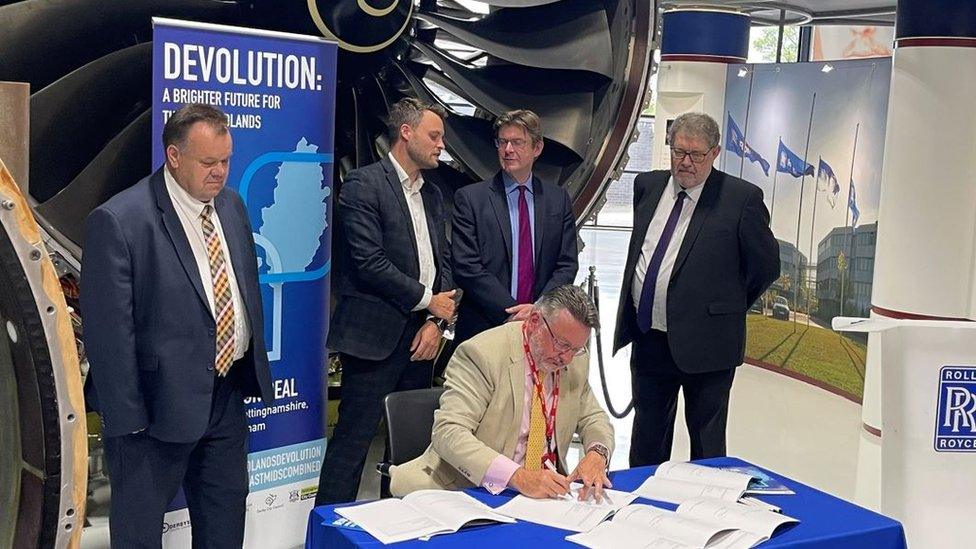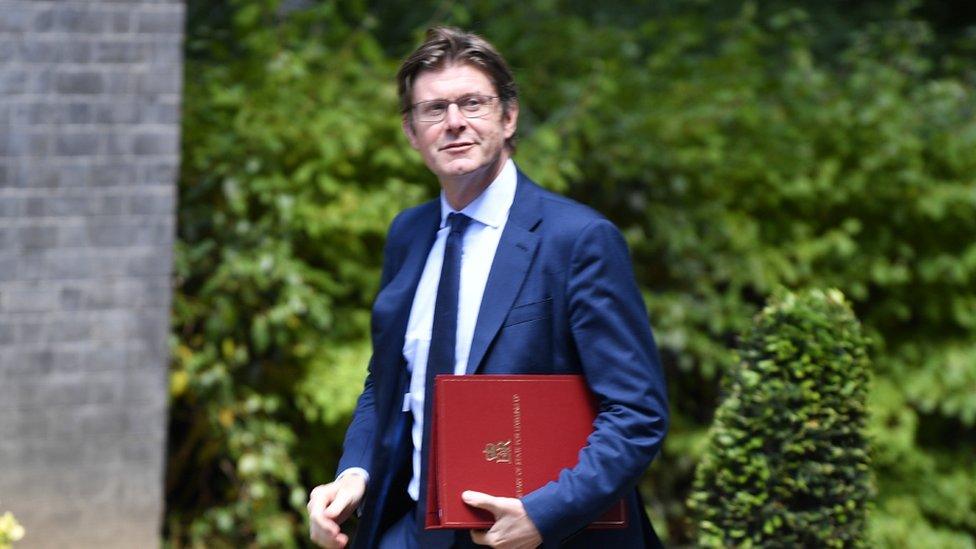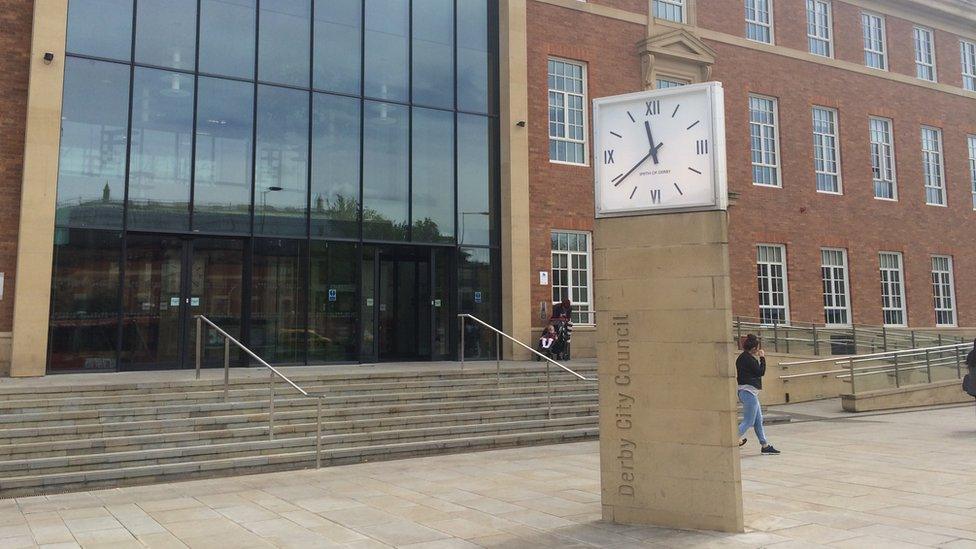East Midlands could get new powers in devolution deal
- Published

Levelling Up Secretary Greg Clark and the leaders of the four councils signed the deal at Rolls-Royce factory in Derby
The East Midlands could receive new powers in a "first of its kind" devolution deal if the government's levelling up bill passes.
The deal would see a Mayoral Combined County Authority in Derby, Derbyshire, Nottingham and Nottinghamshire and the election of a mayor.
The initiative would see some decisions made locally in areas like transport, regeneration and unemployment.
If introduced, the first mayoral elections could take place in 2024.
The holder of the new role would be responsible for delivering local priorities, including education, infrastructure and home building - backed by a £38m per year investment fund - totalling £1.14bn over 30 years.
However, the new devolution model is dependent on parliamentary approval of the government's Levelling Up and Regeneration Bill and necessary secondary legislation, as well as a public consultation.
The bill drew criticism from a group of cross-party MPs on the Levelling Up, Housing and Communities Select Committee, who said it lacked detail and did "little to reassure" that levelling up was "more than a slogan".

Mr Clark said the East Midlands should have "the powers and devolved budgets"
Announcing the deal, Levelling Up Secretary Greg Clark said: "The East Midlands is renowned for its economic dynamism and it has the potential to lead Britain's economy of the future.
"For a long time I have believed that the East Midlands should have the powers and devolved budgets that other areas in Britain have been benefitting from and I am thrilled to be able to bring that about in Derby, Derbyshire, Nottingham and Nottinghamshire.
"I am impressed by the way councils in the region have come together to agree the first deal of this kind in the country, which will benefit residents in all of the great cities, towns and villages across the area of Derbyshire and Nottinghamshire."
The mayoral authority would not replace existing councils.
'Short changed'
In a joint statement, Ben Bradley MP, leader of Nottinghamshire County Council, Barry Lewis, leader of Derbyshire County Council, Chris Poulter, leader of Derby City Council, and David Mellen, leader of Nottingham City Council, said the deal was "fantastic news".
"As leaders, we have all fought for a fairer share for our cities and counties, and a bigger voice for our area, to give us the clout and the influence we deserve, and to help us live up to our full potential," they said.
"This deal would help make that a reality."
However, Unison said it feared the region had been "short-changed".
A spokesperson said the £1.14bn deal over 30 years, or £38m per year, "amounted to £516 per head for the 2.207m residents living within in the combined authority area".
"That figure is significantly less than York and North Yorkshire's £660 each, Tees Valley's £675, the £731 per person for Cambridgeshire and Peterborough and the £815 each given to the West of England when it was founded in 2017," the union added.
Regional secretary Chris Jenkinson said: "This deal amounts to crumbs off a rich man's table.
"When you compare it to other areas of the country our local leaders have accepted a lot less than others to get this deal across the line."

Analysis
By Tony Roe, BBC East Midlands Today
Signed. But not sealed and delivered. Yet.
There's less than a week left of the current Johnson administration. Will the new Prime Minister carry forward the levelling up agenda in the same way as their predecessor when there are so many calls on government spending? This deal promises a billion pounds over 30 years.
Greg Clark, the secretary of state for levelling up, has only been in the job since Michal Gove was sacked last month. He wanted to get this deal over the line before Monday.
There has been criticism that the Levelling Up bill Mr Gove championed lacks clarity. And it needs to become law for today's deal to be delivered.
The East Midlands bumps along at the bottom when it comes to getting a fair share of government spending on things like transport and education.
Business leaders at East Midlands Chamber say the deal signed off is a huge opportunity to correct that. And it also wants Leicester and Leicestershire, not part of today's agreement, to not be left behind.
Greg Clark says he hope they can work out a deal too and he's open to it.
People living in Nottinghamshire and Derbyshire have been promised that they will be able to comment on the detailed proposals later this year. Ten years ago people in Nottingham voted against having a directly elected mayor in a referendum. Now if seems they may be getting one covering an area of the East Midlands where over two million people live.

Follow BBC East Midlands on Facebook, external, on Twitter, external, or on Instagram, external. Send your story ideas to eastmidsnews@bbc.co.uk, external.
Related topics
- Published15 June 2022
